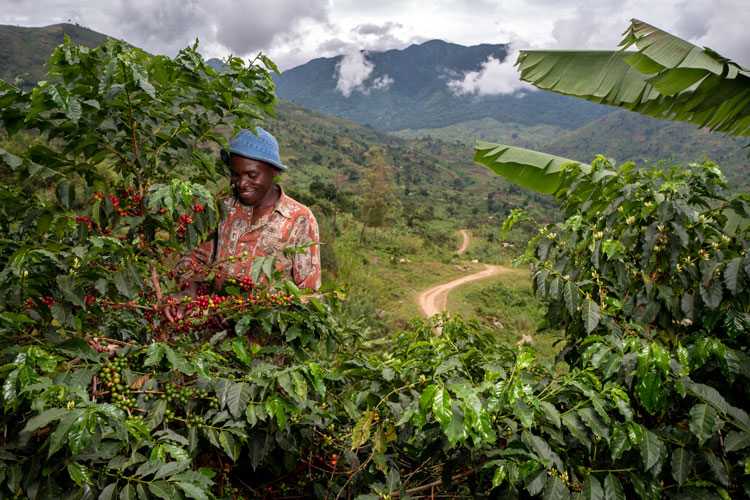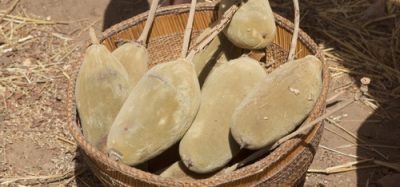Opening doors
- Like
- Digg
- Del
- Tumblr
- VKontakte
- Buffer
- Love This
- Odnoklassniki
- Meneame
- Blogger
- Amazon
- Yahoo Mail
- Gmail
- AOL
- Newsvine
- HackerNews
- Evernote
- MySpace
- Mail.ru
- Viadeo
- Line
- Comments
- Yummly
- SMS
- Viber
- Telegram
- Subscribe
- Skype
- Facebook Messenger
- Kakao
- LiveJournal
- Yammer
- Edgar
- Fintel
- Mix
- Instapaper
- Copy Link
Posted: 5 November 2020 | Guillaume Chesneau (Nespresso) | No comments yet
Guillaume Chesneau, Managing Director of Nespresso UK & ROI, explains how technology can unlock transparency in the coffee supply chain.


Having almost doubled to $90 billion over the past ten years, the global coffee market is growing steadily and projected to reach $102.28 billion by 2023. A staggering 95 million cups of coffee are consumed every day in the UK alone, with this figure estimated to be two billion cups worldwide.
For many of us, this beverage is an elemental part of our daily routine. Yet, while making the perfect drink to kick-start the day can be achieved by a simple touch of a button at home, the journey from bean to cup is rather more complex; involving a range of individuals and entities – from farmers through to cooperatives and coffee companies such as Nespresso.
As sustainability continues its ascent up political agendas, consumers want to know more about this journey. They want to learn about the origin of products, the producers behind them, and feel confident that they are ethically sourced.
So how can technology support transparency and traceability, and why is it so important to sustainability?
Having almost doubled to $90 billion over the past ten years, the global coffee market is growing steadily and projected to reach $102.28 billion by 2023. A staggering 95 million cups of coffee are consumed every day in the UK alone, with this figure estimated to be two billion cups worldwide.
For many of us, this beverage is an elemental part of our daily routine. Yet, while making the perfect drink to kick-start the day can be achieved by a simple touch of a button at home, the journey from bean to cup is rather more complex; involving a range of individuals and entities – from farmers through to cooperatives and coffee companies such as Nespresso.
As sustainability continues its ascent up political agendas, consumers want to know more about this journey. They want to learn about the origin of products, the producers behind them, and feel confident that they are ethically sourced.
So how can technology support transparency and traceability, and why is it so important to sustainability?
Traceability equals responsibility
One of the biggest sustainability challenges across the coffee industry is improving economic and social conditions for smallholder farmers. Currently, around 25 million smallholder farmers produce 80 percent of the world’s coffee, while over 125 million people depend on coffee for their livelihoods. However, in many parts of the world, coffee farming is under threat, and communities that have farmed these lands for generations are struggling.
For Nespresso, protecting these coffee harvests and the communities that produce them is of huge importance. We want to see these exquisite coffees continue to be available for consumers to taste and enjoy. For the communities that we are involved with, we are passionate in working to support farmer livelihoods. As such, we have established a number of partnerships and initiatives that aim to maintain a coffee industry that is beneficial to both farmers and nature, for years to come.
Around 25 million smallholder farmers produce 80 percent of the world’s coffee
A crucial element in understanding how we support and monitor the success of our initiatives is data. Without detailed understanding of metrics, such as amounts of coffee produced versus amounts of high quality coffee that we can buy, we cannot be certain that our efforts are supporting farmers in the right way; in a manner that will empower them to continue improving the quality and volume of their sought-after crop.
Nespresso implemented a full traceability process when it launched its sustainable sourcing programme, the AAA Sustainable QualityTM Program, 17 years ago. The data captured therein has been a cornerstone in how we continue to evolve, develop and improve our support for farmers. It means that we can trace, monitor and be accountable for the actions we take.
Technology enabling new levels of transparency
Today, technology helps us go a step further in how we share our data publicly in an open and transparent way. This year, for the first time, we were able to make the programme data publicly available through blockchain technology.
Blockchain, in simple terms, is a digital record of transactions. The key advantage is that every data transaction is validated by multiple computers in a network. It means that no single source can amend any of the data, making it incredibly robust and trustworthy.
Our platform has enabled consumers to trace high quality, sustainable coffee, produced for our single-origin TAMUKA mu ZIMBABWE coffee, from farms in Zimbabwe all the way through to the Nespresso production centre in Switzerland. It is easy to view the exact dates of transactions, as well as the quality and volumes of the coffee. Our AAA Farm Advanced Relationship Management System makes it possible to trace the transactions with every farmer, while also tracking quality and monitoring progress on sustainable agriculture practices and improvements to farm management.
We continue to enhance transparency across our whole supply chain and blockchain technology is a valuable tool that allows us to share the origins of our products in a meaningful way, while enabling consumers to connect with the farmers behind their favourite coffees. It also permits them to see how ethically sourced the coffee is, and how the sustainable practices we are helping farmers to implement are having a positive impact on coffee communities around the world.
Reviving Origins – the impact behind the data
The TAMUKA mu ZIMBABWE coffee exists solely due to our Reviving Origins initiative in 2019, which constitutes an integral part of the AAA Sustainable QualityTM Program. Through the programme, partnerships are established with farmers, communities and Governments so we can invest in rebuilding sustainable coffee farms that have been impacted by adverse conditions such as conflict, economic hardship or environmental disasters.
blockchain technology is a valuable tool that allows us to share the origins of our products in a meaningful way.
By providing training and technical assistance, our aim is to help farmers embed sustainable practices and enhance the yield and quality of their harvests. By facilitating farmers to produce high‐quality coffee with potential access to a global market, they can attract premium prices. With increased incomes they can build better lives for themselves, their families and their communities.
The challenge in Eastern Zimbabwe was near total destruction of the country’s coffee industry, with production falling from 15,000 tons in the late 1980s to just 500 in 2017, due to decades of economic instability. Support is, however, making a clear difference, with our figures showing that high quality coffee production increased by nine percent from 2018 to 2019 in the Manicaland province.
The farmers behind the coffee
For coffee farmer Jesca Kangai from the Mutasa District of Zimbabwe, being part of the Nespresso AAA Program and Reviving Origins means she can now send her five children to school and has been able to buy a cow and goats to help feed her family. Another farmer from the region, Zachariah Mukwinya, has plans to enlarge his homestead, improve his farm’s irrigation system, and buy a car. According to Midway Bhunu, Coffee Program Manager for our partner in the region, TechnoServe, the work being undertaken in Zimbabwe has been life changing for the farmers involved. “We are seeing greater confidence and hope among the farmers who are working to improve their coffee in order to boost their families’ incomes and future opportunities. I see the lives of these farmers changing,” he said.
Through the new blockchain platform, consumers can discover the valued farmers behind the coffee, see the progress made on the ground, and better understand who and what their coffee purchase is supporting.
In addition to Zimbabwe, the Reviving Origins programme has now been launched alongside single‐origin coffees from the Caquetá region of Colombia (ESPERANZA de COLOMBIA), Puerto Rico (CAFECITO de PUERTO RICO), the Rwenzori Mountains of Uganda (AMAHA awe UGANDA) and the Kivu region of the Democratic Republic of Congo (KAHAWA ya CONGO), as seasonal offers for a limited period.
The long-term aim of the programme is to establish these exceptional coffees as permanent blends, available all-year round for consumers to enjoy. Together with the support of our partners and customers, we are working to bring lasting stability to farmers in Zimbabwe and around the world – and technology is helping us to share, understand and support that journey.
About the author
Guillaume Chesneau is Nespresso’s Business Executive Officer (BEO) for UK & ROI, focused on business growth and recycling and sustainability initiatives. Prior to starting his roleasBEOUK&ROI in November 2018, Guillaume led the Swedish market as BEO from 2016. During this time, alongside his local team, Guillaume developed quality trade distribution, had a focus on physical retail expansion, and successfully led the launch of the Vertuo system in the Swedish market. As a member of the Nordic Leadership Team, Guillaume also contributed significantly to establishing and executing a regional Nordic business strategy, which will determine Nespresso’s business growth for the coming years. Guillaume joined Nespresso in 2008 as Business Development Manager in Australia before moving to New Zealand in 2011 as Country Manager for New Zealand and Pacific Islands.
Issue
Related topics
Beverages, Data & Automation, Food Security, Supply chain, Sustainability, Technology & Innovation, Traceability









